India and Pakistan
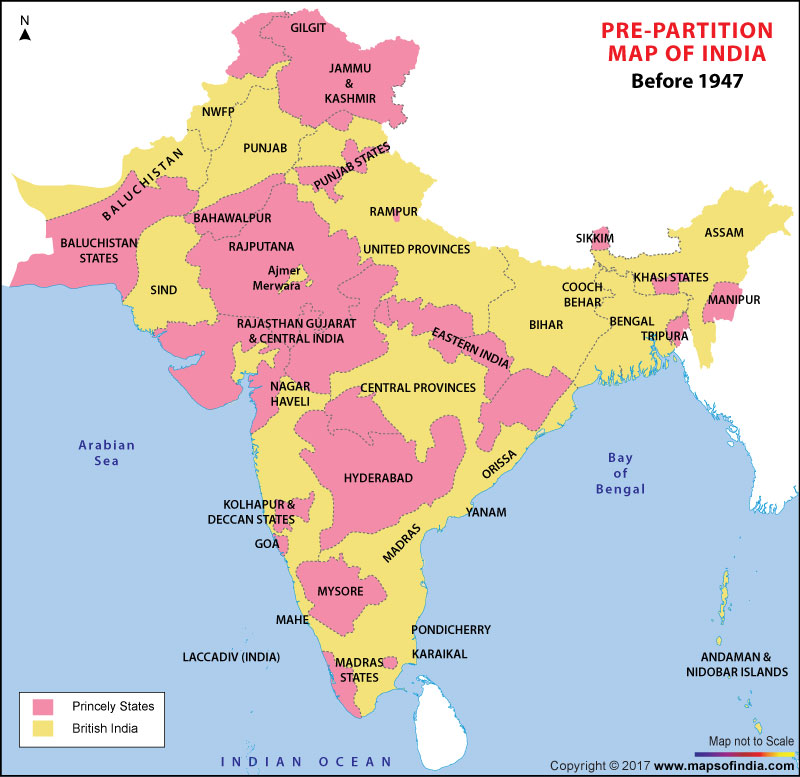
The animosity has its roots in religion and history, and the terrible human cost of Partition. The long-running conflict over the state of Jammu and Kashmir has once again (2019) stirred up tensions between the two nations.
Partition
After more than one hundred years of British East India Company rule and an additional 90 years of the British Raj, the Indian subcontinent achieved its independence on August 15, 1947. What should have been a moment of triumph after years of anti-colonial struggle was instead a scene of horrific violence and bloodshed.
Once again, Britain, in leaving one of her colonies, left things far worse than they had ever been. Thw world saw the same thing happen a bit over 40 years prior to Partition, when Britain left its oldest and closest colony, Ireland, and the island fell into a civil war.
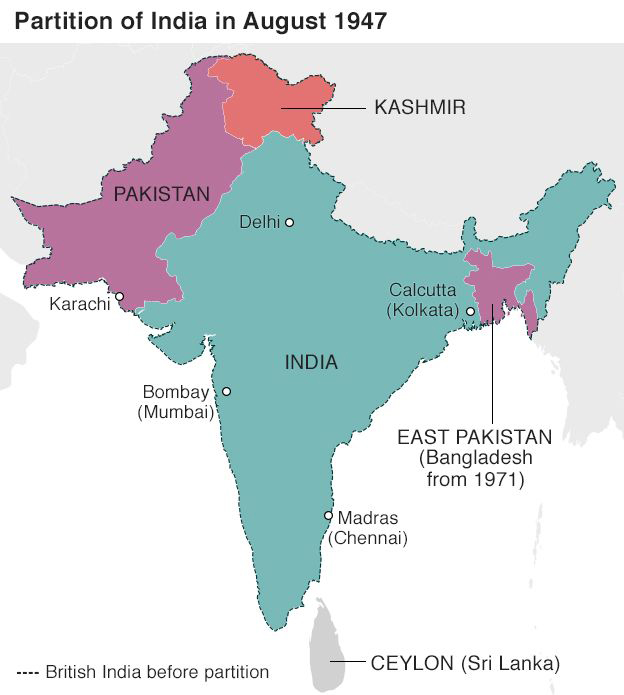
But the Irish Civil War of 1921-22 had nothing on the deaths due to the British leave-taking of India. Up to two million people lost their lives as the British left the subcontinent. The 1947 Partition of the Indian subcontinent into the independent nations of a Hindu-majority India and a Muslim-majority Pakistan was accompanied by one of the largest mass migrations in human history and violence on a scale that had seldom been seen before. As the provinces of the Punjab and Bengal were effectively split in half, approximately seven million Hindus and Sikhs and seven million Muslims found themselves in the wrong country. Believing they would return "home," many families left their valuables behind before they packed up their essential belongings and began the trek to India or West or East Pakistan (now Bangladesh). Many never made it.
War and Strife
Almost immediately after such a great slaughter on both sides, within two months of Partition, India and Pakistan first went to war. In October of 1947, Pakistan supported a Muslim insurgency in Kashmir. India agreed to a request for armed assistance from Kashmir's Maharaja, in return for accession of the state to India. But the nature of that accession has long been the subject of debate. The war ended on 1 January 1949, with the establishment of a ceasefire line. The status of the territory has remained in dispute because an agreed referendum to confirm the accession was never held.
After more border strife in the 1960s, in 1971 Pakistan descended into civil war after East Pakistan demanded autonomy and later independence. India invaded East Pakistan in support of its people after millions of civilians fled to India. At the end of 1971, Bangladesh was created out of East Pakistan.
Now It's Nukes
The conflict between the two countries escalated beyond a theater-level war to something far more global when, in 1998, first India then Pakistan test-fired nuclear weapons. Now this volatile struggle caused great consternation in other national capitals throughout the world.
Although both countries have tried to maintain a fragile cease-fire since 2003, they regularly exchange fire across the contested border, known as the Line of Control. Both sides accuse the other of violating the cease-fire and claim to be shooting in response to attacks.
Terrorism
In 2005, members of Lashkar-e-Taiba, an Islamic terrorist organization based in Pakistan, triggered bombs in two markets and a city bus in the Indian city of Delhi. 62 people were killed and over 200 were injured.
In 2008, members of the same organization, among other terrorist organizations, carried out a number of shooting and bombing attacks in the Indian cities of Jaipur, Bangalore, Ahmedabad, Delhi (twice), Malegaon, Modasa, Agartala, Imphal, Assam, Mumbai, and Guwahati. By the end of the year, terrorists had killed at least 474 Indians, and injured over 1,600 Indians in their attacks.
Kashmir's "Special Status"
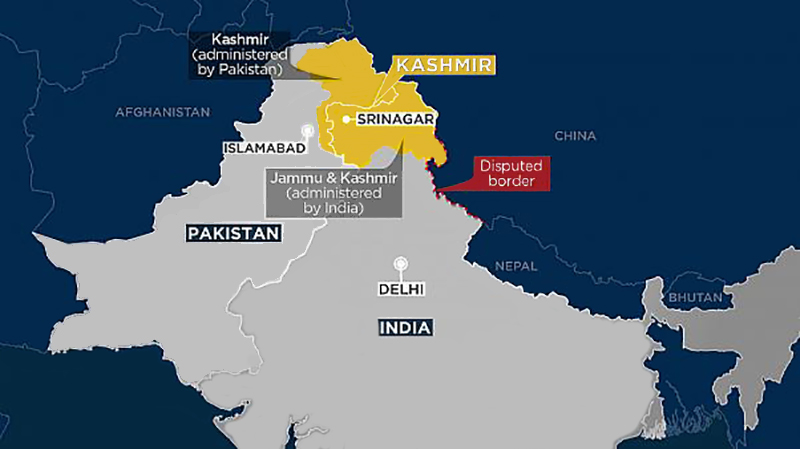
On August 5, 2018, the Indian government revoked the special status of Indian-administered Kashmir in its constitution, the most far-reaching political move in the disputed region in nearly 70 years.
Formerly, India guaranteed special rights to the Muslim-majority state, including the right to its own constitution and autonomy to make laws on all matters, except defense, communications and foreign affairs. Now, Kashmir and Jammu have essentially lost their autonomy, as India has unilaterally claimed them, and has been enforcing its will militarily.
In the lead-up to the move, India sent thousands of additional troops to the disputed region, imposed a crippling curfew, shut down telecommunications and internet, and arrested political leaders.
The move has worsened the already-heightened tensions with Pakistan, which said it would downgrade its diplomatic relations with India.
Both India and Pakistan claim Kashmir in full but rule it in part. The nuclear-armed neighbors have fought two of their three wars over the disputed territory.
The Greatest Irony, or An Indicator?
The escalating tensions in the region so worry other international actors that very unlikely voices have been weighing in on the matter.
On 10 August 2019, the Taliban in Afghanistan, the "Islamic Emirate of Afghanistan," the fundamentalist political and military organization currently waging war within that country, against whom the U.S. has been fighting since 2001, issued a statement on the India/Pakistan dispute:
“The Islamic Emirate expresses deep sadness in this regard and urges both India and Pakistan to refrain from taking steps that could pave a way for violence and complications in the region and usurp the rights of Kashmiris.”
“Having gained bitter experiences from war and conflict, we urge peace and use of rational pathways to solve regional issues. . . . We call on both involved parties, OIC, Islamic countries, the United Nations and other influential institutions to play a constructive role in preventing insecurity in Kashmir. By using your influence, encourage both sides to prevent the spread of crisis and resolve the issue in a calm and composed manner.”
On the Brink of WWIII
On 26 September 2019, the Prime Minister of Pakistan, Imran Khan, warned of an all-out conflict with India, saying that there will be a “bloodbath” once India lifts the curfew it imposed in disputed Kashmir. In a speech to the General Assembly of the United Nations, Khan said, “When a nuclear-armed country fights to the end, it will have consequences far beyond the borders. It will have consequences for the world. That’s not a threat — It’s a fair worry. Where are we headed?"
By 30 September, the head of Pakistan-administered Kashmir warned that a deteriorating security situation along and across the disputed border with India had the potential to escalate into a nuclear conflict that could reshape the world as we know it. Azad Kashmir President Masood Khan described the situation on the frontier as "volatile." Most ominously, he stated, "We are in a state of war right now, but the situation could escalate even further. Any military exchange will not remain limited, it can and we fear it would escalate to the nuclear level, that is tantamount to nuclear armageddon."
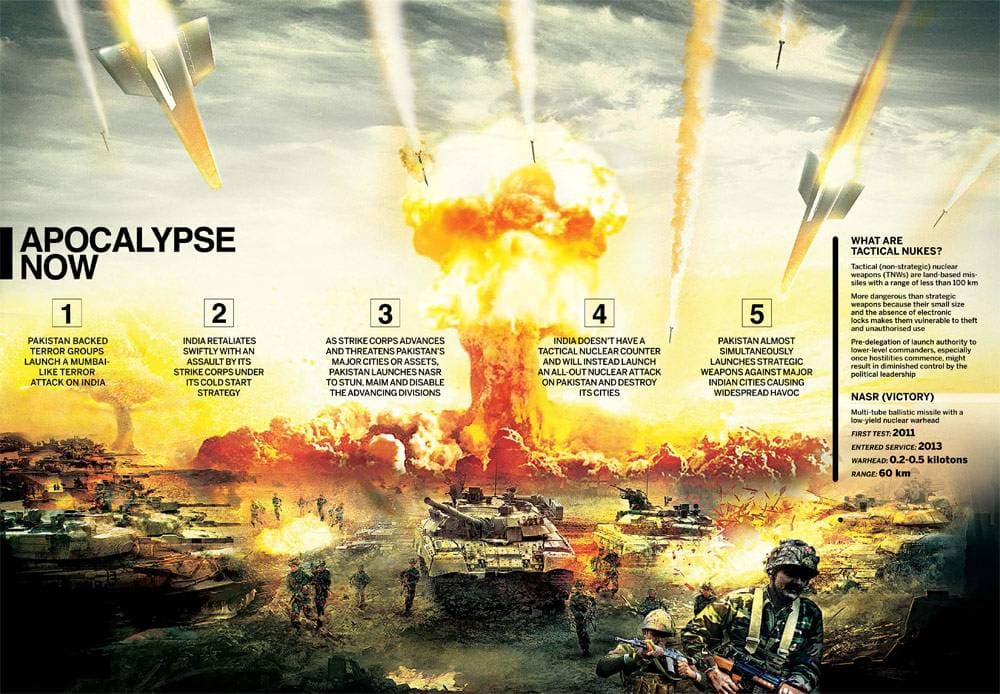
Chengappa, Raj. "Pakistan's New Nuke Threat: Why India Has to Worry." India Today, 20 June 2016.
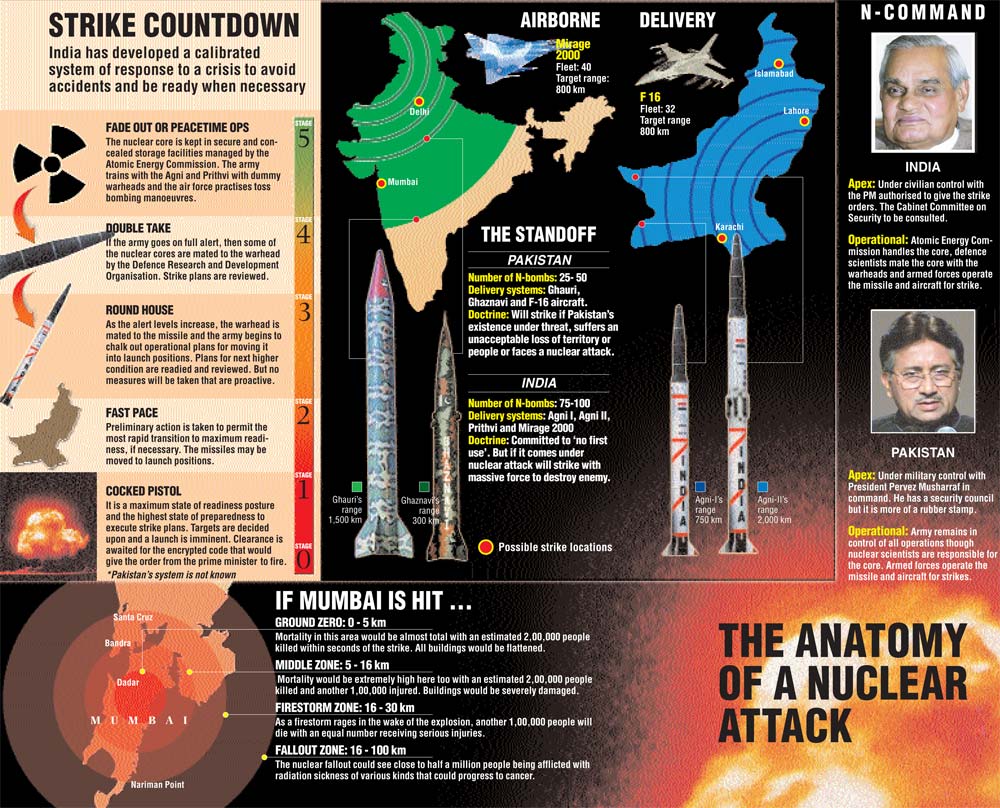
Chengappa, Raj. "Conflict Between India, Pakistan Could Result in 12 Million Dead in Both Nations." India Today, 10 June 2002.
Chengappa, Raj. "Conflict Between India, Pakistan Could Result in 12 Million Dead in Both Nations." India Today, 10 June 2002, www.indiatoday.in/magazine/cover-story/story/20020610-conflict-between-india-pakistan-could-result-in-12-million-dead-in-both-nations-795120-2002-06-09#.
———. "Pakistan's New Nuke Threat: Why India Has to Worry." India Today, 20 June 2016, www.indiatoday.in/magazine/cover-story/story/20160620-nuclear-missiles-pakistan-india-829029-2016-06-09#.
"Conflict Between India and Pakistan." Global Conflict Tracker, The Council on Foreign Relations, www.cfr.org/interactive/global-conflict-tracker/conflict/conflict-between-india-and-pakistan.
"India Revokes Kashmir's Special Status: All the Latest Updates." AlJazeera News, www.aljazeera.com/news/2019/08/india-revokes-kashmir-special-status-latest-updates-190806134011673.html.
"India-Pakistan: Troubled Relations." BBC News, 2005, news.bbc.co.uk/hi/english/static/in_depth/south_asia/2002/india_pakistan/timeline/default.stm.
O'Connor, Tom. "Pakistan's Kashmir President Says There's Now a 'State oof War' with India, Warns Nuclear Fight Would Change the World." Newsweek, 30 September 2019, www.newsweek.com/pakistan-state-war-india-nuclear-fight-1462183.
"Pakistan’s Khan Warns of All-Out Conflict Amid Rising Tensions Over Kashmir; Demands India Lift ‘Inhuman’ Curfew." UN News: Global Perspective, Human Stories, 27 September 2019, news.un.org/en/story/2019/09/1047952.
Perkins, C. Ryan. "1947 Partition of India & Pakistan." The 1947 Partition Archive: Survivors and their Memories. Stanford University Libraries, exhibits.stanford.edu/1947-partition/about/1947-partition-of-india-pakistan.
Roy, Shubhajit. "Taliban Note Urges India, Pakistan to Avoid Acts that may Pave Way for Violence." The Indian Express, 10 August, 2019, indianexpress.com/article/india/taliban-note-urges-india-pak-to-avoid-acts-that-may-pave-way-for-violence-kashmir-article-3705893395/.